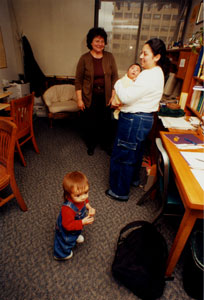|
HOME | SEARCH | ARCHIVE |
|
A haven for nontraditional students
Re-entry, transfer and student parent centers join forces to better serve their constituents
![]()
By D. Lyn Hunter
Public Affairs
| |  At the Student Parent Center’s lounge, children can play while their parents study, network or take a break between classes. Pictured (from front to back) are Noah Stradleigh, Suyapa Villarir, holding her daughter Victoria, and Alice Jordan, director. Peg Skorpinski photo |
13 March 2001
|
For thousands of non-traditional Berkeley students, the Re-entry, Transfer and Student Parent centers provide a welcome refuge. “Berkeley’s size and pace can make non-traditional students feel isolated,” said Barbara Gross Davis, assistant vice chancellor for student life-educational development. “The centers are a place these students can call their own, a place to meet people with similar experiences. It helps them feel connected.” To better serve this population, these three programs — which previously operated as separate entities within Undergraduate Affairs’ student life-educational development cluster — have now been administratively aligned and located under one roof, at the César Chávez Student Center. “There’s a lot of overlap in these three areas,” said Davis. “Of the 4,800 transfer students we have, 90 percent are re-entry and 77 percent are student parents.” The recent realignment helps the units collaborate, share resources, and better serve their clients, Davis said. “We want students to be able to choose the community they want to be a part of,” said Davis. “And many of our students belong to more than one group.” The Re-entry Student Center assists students 25 years and older who are making a transition back into the educational environment. It offers counseling, peer advising and classes that help acclimate students to life at Berkeley. At the Transfer Student Center, students who have come to Berkeley from community colleges can get academic support, resources and advising. The Student Parent Center offers services, including classes and support, for those balancing school and child-rearing responsibilities. “By teaming together,” said Helen Johnson, director of the Re-entry Student Center, “we make each program stronger.” In addition to workshops and advising services, each center offers a lounge area — complete with sofas, phones, coffee, computers and bulletin boards — where students can socialize, relax, network or study. An integral part of the success of these programs, says Davis, is the full-time staff and volunteers who work with them. “Most of the student volunteers have been through the same experiences as the students they are advising,” said Davis. “They know first-hand what the challenges are and how to overcome them.” These services are also a valuable recruiting tool, Davis said. During outreach and yield activities, student volunteers talk to prospective students about the centers. “Knowing these programs exist sends a message to non-traditional students,” said Johnson. “The campus cares about them.”
Care has been taken, she added, to preserve the integrity of each program.
Home | Search | Archive | About | Contact | More News
Copyright 2000, The Regents of the University of California.
Produced and maintained by the Office of Public Affairs at UC Berkeley.
Comments? E-mail berkeleyan@pa.urel.berkeley.edu.